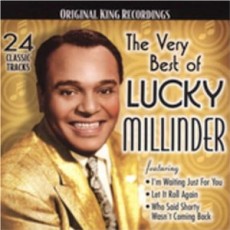
Daily Dose Of Jazz…
Lucky Millinder was born Lucius Venable Millinder on August 8, 1910 in Anniston, Alabama but was raised in Chicago, Illinois. While a teenager in the 1920s he worked in clubs, ballrooms, and theatres in Chicago as a master of ceremonies and dancer. He first fronted a band in 1931 for an RKO theater tour, and in 1932 took over leadership of Doc Crawford’s orchestra in Harlem, New York City, as well as freelancing elsewhere.
The Thirties saw Lucky touring Europe with his own orchestra and playing residencies in Monte Carlo and Paris, returning to New York to lead the Mills Blue Rhythm Band, discovering Rosetta Tharpe, teaming with Bill Doggett’s group, established a residency at the Savoy Ballroom and signed a contract with Decca Records, in which Dizzy Gillespie sat in the trumpet seat.
Millinder would record “Trouble In Mind” in 1941 with Rosetta Tharpe, as well as his #1 hit “When The Lights Go On Again (All Over The World)” followed by “Apollo Jump” and “Sweet Slumber”. But by the mid-1940s the band was drifting towards what would be known as rhythm and blues and was comprised of saxophonist Bull “Moose” Jackson, Tab Smith, Eddie “Lockjaw” Davis and pianist Sir Charles Thompson and singer Wynonie Harris. Their recording of “Who Threw The Whiskey In The Well” became the group’s biggest hit in 1945, staying at #1 on the charts for 8 weeks. Vocalist Ruth Brown replaced Wynonie for a short period until her solo career took flight.
Throughout the decade the band continued to remain popular and toured all the large R&B auditoriums, changed labels a few times until their last big hit was “I’m Waiting Just for You” with Annisteen Allen in 1951. A year later Lucky was working as a radio deejay, continued to tour and took over the leadership of the Apollo Theater band for a while. Retiring from performing he recorded his final sessions in 1960 and became active in music publishing, and in public relations for a whiskey distillery.
Swing and rhythm and blues bandleader Lucky Millinder, never learned to read or write music, nor play an instrument and rarely sang, it is said it was his showmanship and musical taste made his bands successful. He passed away from a liver ailment in New York City on September 28, 1966. Twenty years later he would posthumously be inducted into the Alabama Jazz Hall of Fame.
More Posts: bandleader


